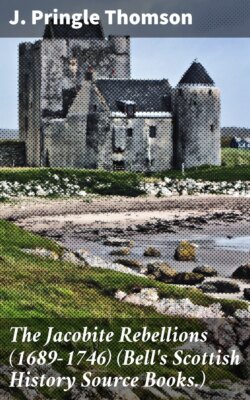Читать книгу The Jacobite Rebellions (1689-1746) (Bell's Scottish History Source Books.) - J. Pringle Thomson - Страница 10
На сайте Литреса книга снята с продажи.
THE RELIGIOUS SETTLEMENT (1690).
ОглавлениеTable of Contents
Source.—Letters and State Papers chiefly Addressed to George, Earl of Melville, Secretary of State for Scotland, 1689–1691, p. 436. (Edinburgh: Bannatyne Club, 1843.)
22 May, 1690
WILLIAM R.
His Majesties Remarques upon the Act for settling Church Government in Scotland, Which, together with some reasons designed for the clearing of it, and answering those objections that might be made against it, was sent to him by My Lord Commissioner.
1st, Whereas it is said that the Church of Scotland was reformed from Poperie, by Presbyters without Prelacy, his Majesty thinks, that tho this matter of fact may be true, which he doth not contradict, yet it being denied by some who discourse much of a power that Superintendents had in the beginning of the Reformation, which was like to that which Bishops afterwards had, it were better it were otherwise expressed.
2d, Whereas it is said that their Majesties do ratify the Presbyterial Church Government to be the only Government of Christ's Church in this kingdom; his Majesty desires it may be expressed thus—to be the government of the Church in this Kingdom established by law.
3d, Whereas it is said that the government is to be exercised by sound Presbyterians, and such as for hereafter shall be owned by Presbyterian Church Judicatories, as such; his Majesty thinks that the rule is too general, depending as to its application upon the opinions of particular men; and therefore he desires that what is said to be the meaning of the rule in the reasons sent to him, may be expressed in the Act, viz., That such as shall subscribe to the Confession of Faith and Catechisms, and are willing to submit to the government of the Church, as established by law, being sober in their lives, sound in their doctrine, and qualified with gifts for the ministry, shall be admitted to the government, and his Majesty doth judge that the following Declaration might be a good Test:—
I, A—— B—— do sincerely declare, and promise, that I will own and submit to the present government of the Church, as it is now by Law established in this Kingdom, and that I will heartily concur with and under it, for the suppressing of sin and wickedness, the promoting of piety, and the purging of the Church of all erroneous and scandalous Ministers; and I do also assent and consent to the Confession of Faith, and the Larger and Shorter Catechisms, now confirmed by Act of Parliament, as the Standard of the Protestant religion in this Kingdom.
… 5th, As to what concerns the meeting of Synods and General Assemblies, his Majesty is willing that it should be enacted, that they meet at such and such times of the year, and as often as shall be judged necessary, provided always, that they apply to him or his Privy Council to know if there be any inconveniency as to public affairs in their meeting at such times, and have his allowance accordingly; and that in all their General Assemblies, a Commissioner in the name of his Majesty be there present, to the end, that nothing may be proposed, but what merely concerns the Church; and in case anything relating to the Civil government, or that is prejudicial to it, should be there proposed or debated, the said Commissioner may give a stop to it, till he has acquainted the Privy Council, and received their direction in it.
6th, Whereas it is desired to be enacted, that the parishes of those thrust out by the people in the beginning of this Revolution be declared Vacant upon this reason, because they were put upon congregations without their consent, his Majesty desires it may be so expressed, as may be consistent with the rights of Patrons, which he thinks he hath the more reason to desire, because in the reasons sent up with the Act, it seems to be acknowledged that this procedure is Extraordinary, and not to be drawn into consequence. …
His Majesties resolution to be candid and above board in what he does, and his desire, that what is now granted by him to the Church may not be uneasie to him afterwards, do incline him to have the above-mentioned amendments in the Act.
It is his Majesties desire, that such as are of the Episcopal persuasion in Scotland have the same Indulgence that Dissenters have in England, provided they give security to live peaceably under the Government, and take the Oath of Allegiance.
W. R.
